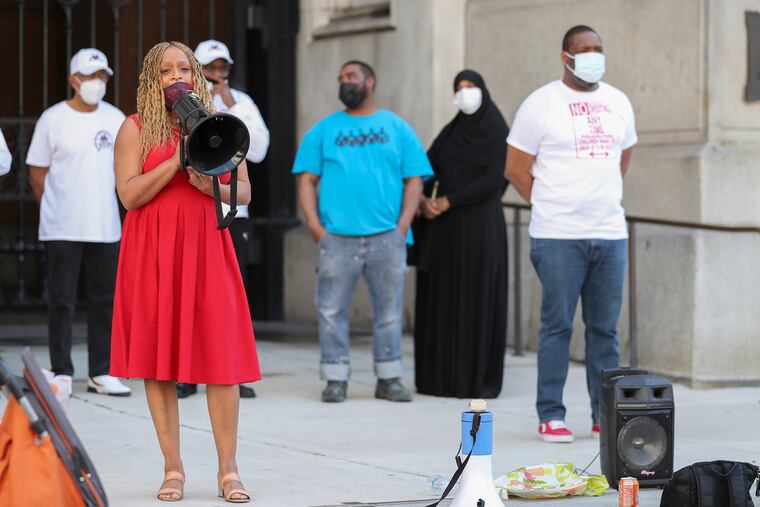Solving gun violence in Philly needs more than buzzwords | Opinion
We must apply an evidence-based approach to gun violence by defining and monitoring gun violence in Philadelphia, identifying risk and protective factors and scaling effective programs.

As homicide rates fueled by gun violence continue to rise in Philadelphia, there appears to be no thoughtful remedy in sight from Mayor Jim Kenney that effectively applies a public health approach. As of April 5, the city had already reached 125 homicides this calendar year. Community members, advocates, and local elected officials alike are looking for Mayor Kenney to address this crisis with a sense of urgency.
Last fall, Councilmember Jamie Gauthier introduced a resolution urging the mayor to implement a public health approach to gun violence. The measure was overwhelmingly passed by City Council. Gauthier’s resolution called for the mayor to address gun violence in Philadelphia by mirroring the city’s public health approach to address COVID-19. The resolution specifically requested that the mayor’s office increase transparency by holding weekly public briefings on the progress of the city’s implementation of violence mitigation strategies, while also facilitating more strategic coordination with community, private and public sector partners.
» READ MORE: 10 ideas to stem the tide of Philly’s gun-violence crisis
This resolution should not have been difficult for the mayor’s office to adopt and implement. Mayor Kenney has often acknowledged gun violence is a public health issue, and his administration used a public health lens to develop the city’s Roadmap to Safer Communities that was released in January 2019. The public health approach to gun violence implements evidenced strategies that we have seen successfully eradicate diseases like polio, reduce smoking-related deaths, and decrease the number of motor vehicle crashes and deaths. We must apply this evidence-based and effective approach to gun violence by defining and monitoring gun violence in Philadelphia, identifying risk and protective factors, and scaling effective programs that reduce violence.
But Mayor Kenney’s office, apart from not taking visible steps to implement this approach, has not even opened the program for community review. It took six months of advocacy from community members, violence prevention organizations, and members of City Council for the mayor to agree to host regular public briefings to acknowledge the city’s challenges, solutions, and resources allocated to reduce gun violence. Even then, the mayor acted on this program only after antiviolence activist Jamal Johnson went on a hunger strike outside City Hall.
» READ MORE: Demand accountability where the people in power can’t ignore you | Helen Ubiñas
The mayor finally hosted the first public briefing on the city’s violence interruption program on March 14 — only to present what seemed to be a weekly update from the Philadelphia Police Department, failing to reflect the public health model. The practice of having the police commissioner as the face of gun-violence prevention is a recurring pattern. When City Council’s Special Committee on Gun Violence Prevention holds public hearings, law enforcement professionals, the Police Department, and the District Attorney’s Office typically speak before the Office of Violence Prevention.
In an unfortunate turn of events, the necessity to develop a sense of urgency to reduce gun violence was underscored late last month when an advocate, John Solomon, had to be excused from the committee’s latest hearing as his brother was struck by a firearm. The lack of urgency, consistency, and transparency, as well as the law enforcement-heavy approach, leaves the public wondering if public health within the context of the city’s violence-prevention strategy are simply buzzwords. When the city responded to COVID-19 as a public health issue, there was no delay nor any advocacy needed for transparency on mitigation strategies, or coordination of stakeholders and resources being allocated.
» READ MORE: The reality of Philadelphia’s gun-violence epidemic crashes a virtual hearing | Helen Ubiñas
However, when it comes to gun violence, it is the exact opposite. To stem this tide of gun violence, the Mayor’s Office must truly commit to address gun violence as the public health epidemic that it is. There is no time like the present, as the city plans to release its Roadmap for Safer Communities 2.0, next week. The plan is said to focus on three phases of gun violence: pre-event, event, and post-event, and among other things, work to address environmental factors, while providing workforce development opportunities for those at elevated risk to be impacted by gun violence.
A critical piece to success this time around for the city’s Roadmap will be moving the Office of Violence Prevention (OVP) to the city’s Public Health Department. This move would allow for the ongoing necessary coordination with other agencies to effectively address social determinants of health, which among other factors include the lack of access to quality paying jobs, public education, and social services, and which perpetuate violence. In addition, moving OVP would allow the appropriate individuals to support the implementation, research, and evaluation of the city’s violence intervention and prevention programs. This recommendation is not new, as cities including Milwaukee house their Office of Violence Prevention in their public health departments.
As we see violence increase, resources do seem to be coming available through the federal government with the American Rescue Plan, and President Joe Biden’s proposed $5 billion investment in community violence within his infrastructure plan. While this investment is welcome, and on the radar of city officials, all of the financial resources in the world will not address gun violence in Philadelphia unless the city implements a sustainable evidence-based plan that truly operates within the realm of public health. The public health epidemic of gun violence will continue to plague us long after we flatten the curve with COVID-19 if Mayor Kenney does not back up his own words with consistent commitment.
Lauren Footman, who resides in Greater Philadelphia, is director of outreach and equity for the Coalition to Stop Gun Violence and the Educational Fund to Stop Gun Violence. @laurenjfootman